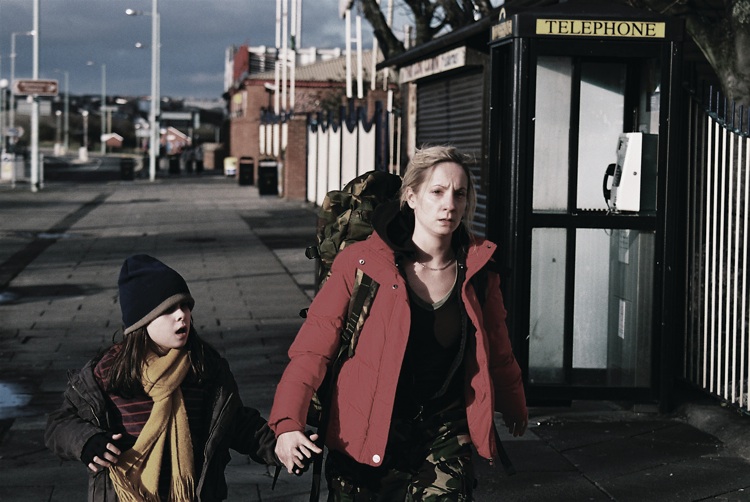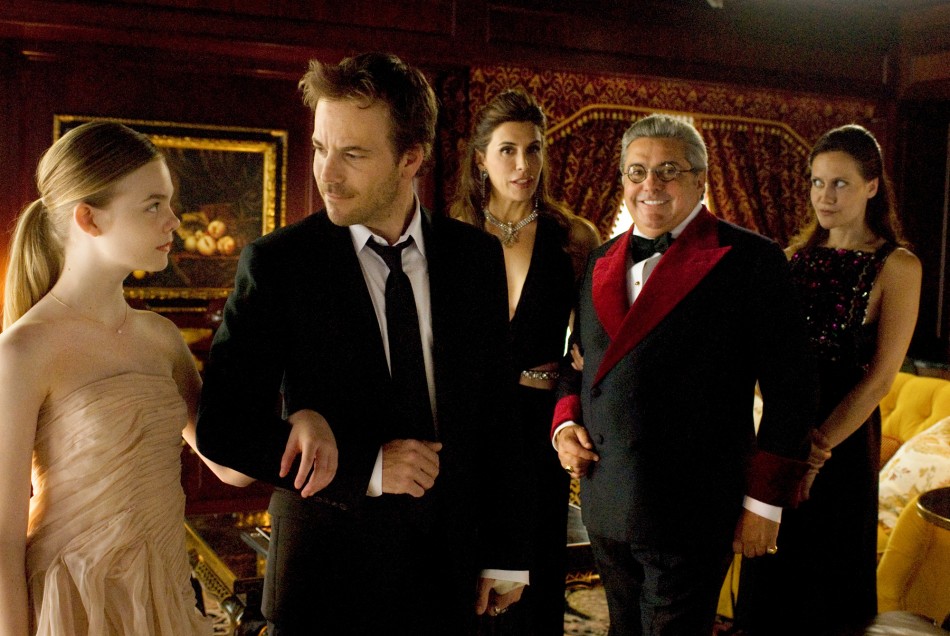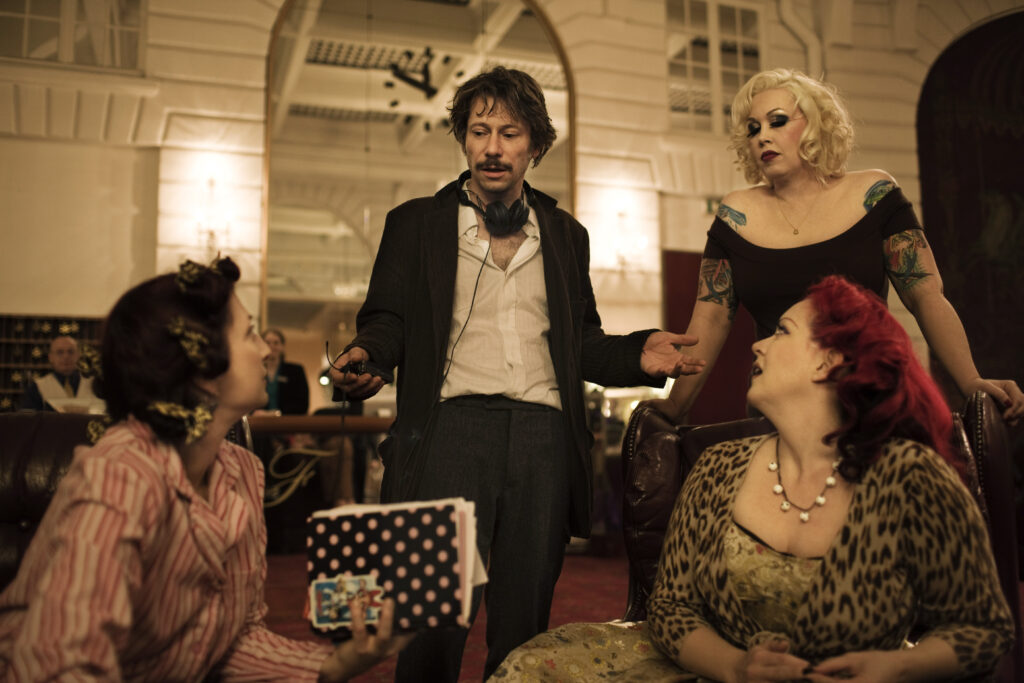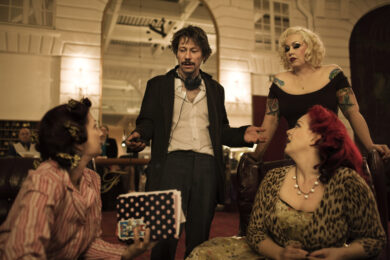On Tour
There can be little more warming in a character than when their fumbled struggle against adversity is a struggle against their own incompetence and neuroses. In this way, Joachim (Mathieu Amalric), who takes his troupe of burlesque artists round France in the hope of making the big time, fits perfectly into the worn cheap suit of the anti-hero. Behind his outward ambition is a lurking self-disgust that he seems always at constant pains to repair.
Having left his homeland of France some years previous, leaving a torrid sea of regrets and betrayals behind him, the hapless Joachim returns from America with a troupe of curvaceous burlesque artists with modest hopes of success. Helped by a thin tache, Joachim wonderfully evokes a fluctuating sense of antipathy and adoration for the spiv clown. Against adversity, he soldiers on wearing the dumbfounded optimism of someone who would try to present a turd as an exotic accoutrement de fashion.
The dancers’ cheeky show floats on top of a greater cause to reassert the theatrics and humour of Vaudeville with an explicit liberalness fitting to the times. Though their inventive performance gathers momentum, Joachim and his troupe set their sights on Paris, the city of some unfathomable promise that sits just over the horizon of their reach. Yet unbeknown to the dancers, they must overcome Joachim’s past misgivings to attain their goal. Though they’re not entirely trusting of Joachim, the dancers love him like a younger brother who must work twice as hard to earn their respect.
Each dancer carries their own unique story, held together by their affirmation that, after experiencing a crueller world, they have achieved some form of satisfaction. Like star-crossed teenagers who share a morbid outlook, Joachim and show stealer Mimi Le Meaux (Miranda Colclasure) are gradually drawn together as if seeing a kindred dispirited face of longing in the other.
Hilariously fixated with the volume of music in hotel lobbies, Joachim’s constant struggles against the bureaucracy of hotel music policy brings out his ongoing fight against the world’s chronic plight to undermine his every move. This conflict between the hard working and passionate Joachim, and the opinions thrust on him by others, is exacerbated when Joachim receives a surprise visit from his two sons and is reintroduced to his father and brother. While his sons regard him with the kind of scorn reserved for a diseased rabbit – a feeling they ought to enjoy his company buried beneath a scab of vague odiousness – his father and brother just plain hate him. Though the bile they lumber on him is somewhat at odds with the hardworking promoter, Joachim’s anxious squirms betray the presence of a man trying to escape his own skin.
On Tour succeeds in showing the glamour of the theatre against the banality of a monotonous life that lurches between drab hotels and dreary lift music. Colourful, evocative and humorous, On Tour is its own thrown together Vaudeville act; even the grime is loveable.
In Our Name

A war film in which there are no scenes of actual war is one of many brave characteristics of British film In Our Name. Many of the atrocities of the Iraq war have been documented in the suffering of innocent lives of the Iraqi people, and the state of complete disrepair into which their homes have been turned. In Our Name is a troubling yet restrained exposé of the psychological damage suffered by many of the soldiers that return from Iraq.
By showing the differing ways the soldiers respond to the strain of conflict, the film offers a rare depth that holds back, in the most part, from casting judgement on any actions. In this way, the toils of war are given a more directly personal and thought provoking moral dimension.
After serving an arduous tour fighting in Iraq, Suzie comes home to a hero’s welcome with a disturbed new perspective built by what she’d witnessed. Yet her situation at home worsens as she fights to win back the trust of her young daughter and gain compassion from her brawling, laddish husband Mark, also a soldier, whose seems singularly obsessed with defending his conjugal rights.
Centring the film round a strong female character eliminates the threat of the cowboy cliché. After all, even the acclaimed Hurt Locker couldn’t get beyond the unhinged yet righteous lone-cowboy – the steely-eyed mercenary feared by enemies, but none can get close to – suggesting that we haven’t culturally moved that far forwards when a woman can only win an Oscar if she uses a penis as a paintbrush.
Part of the baggage Suzie brings back with her is the ambiguous relationship she has with fellow soldier Paul, who is a red rag to Suzie’s husband Mark’s testosterone-pumped bull. The revelations of what Suzie saw while on tour build with his ever more threatening behaviour, and he wavers from being an insufferable prick or merely a bit of a git driven wild by the excesses of war. As the tension builds, the mother’s aim to protect her daughter for the most part vindicates her actions.
When issues of cultural and religious tension involving British Muslims arise, the film asks some quite stark questions yet stands unapologetically on the bias position of the British soldiers – perhaps brash considering the current sensitivity surrounding such issues. Amongst the casualties, the only victims are the British soldiers. Adding to this, the ravages of war that brutalise Suzie’s conscience are acts carried out by Iraqi soldiers. These use powerfully emotive mental imagery to win the side of virtue: both at home and in war, it’s the enemies’ disregard for young girls that elicits shock and rage.
Putting the little book of liberal ire aside momentarily, In Our Name obviously brings up important issues that affect British soldiers. Whether it’s responsible given the current climate to only give this one perspective is a fascinating question, but one for a different time – and it’s certainly worth pondering after watching.
Somewhere

A sickly sweet love story following the developing relationship between a disillusioned Hollywood actor and his eleven year-old daughter, as heroically named Johnny Marco (Stephen Dorff) suffers a slow burning crisis as he’s trailed by excesses and hedonism. Plodding through various stages of nonchalance, it’s the arrival and building connection with his daughter, and not the pole dancing twins, that brings colour to his cheeks.
The comparisons to Lost In Translation are well observed by Toby Manning, so there’s little point repeating them. But the self-reflective disenchantment is a theme repeated with more revolutionary vim in I’m Still Here, Joaquin Phoenix’s baffling journey to find self-expression via a bout of violent self-destruction. Again as in I’m Still Here, Somewhere focuses on the self-disgust and alienation of a young actor at the top of his profession.
Both films artfully expose the detachment and breakdown of what are perceived as aspirational characters, yet where I’m Still Here drills to the core of a crisis of identity, Somewhere cradles Johnny in his downfall, wiping the thinly glittered veil of appeal from his lifestyle. Again where both films triumph is a dose of the sanguine, as both central characters, with various degrees of success, aim towards something better while severing their lives from around them. The result, sticking with Somewhere, is tragedy balanced against a column of optimism that rises skywards beyond the film’s end.
This worried sense of detachment can be caught in the simple vagueness of the title: Somewhere is the expression Johnny carries round on his face the entire film. His understated reactions gently tug chords of suspense and grief as the film goes on, allowing his restrained expressions to steadily increase in volume; a man with all that wealth and fame can acquire is lit up only by his daughter. Though this sentimentality is evident in the film, it’s never put that crudely. There’s tremendous elegance and wit in sequences that could have, if bluntly handled, disintegrated under slushy sentimentality. The comparison between Johnny’s reaction to twins gyrating on poles in his bedroom and seeing his daughter ballet dancing is one of the more well handled sequences, marrying a simple revelation with a sense of humour.
If there’s one thing Sophia learnt from her old man, it’s where to stick a camera to make a film play like a wonderfully orchestrated photography gallery, with its temperate pace allowing for real involvement with the characters. Somewhere’s sense of ease demonstrates a maturing director and, if the celeb-centric narratives can reach for greater originality, there’s an enthusiastic expectation of things to come.



